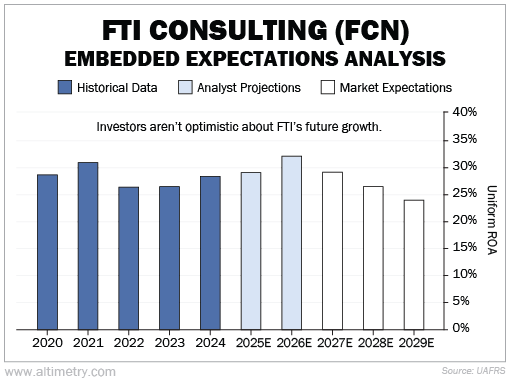 Consultants used to spend hours combing through archives, formatting slides, and hunting down subject-matter experts...
Consultants used to spend hours combing through archives, formatting slides, and hunting down subject-matter experts...
Now, AI tools are completing those tasks... almost instantly.
McKinsey's chatbot Lilli, for example, scours the consulting firm's 100-year knowledge base in seconds. It highlights documents, summarizes insights, and even connects staff to in-house experts.
Boston Consulting Group's ("BCG") Deckster builds pitch decks using peer benchmarks. It also gives junior staff instant feedback based on managers' best practices.
Other AI tools, like BCG's conversational agent GENE, can create content and absorb research to speed up brainstorming sessions.
Simply put, AI helps employees move faster and work smarter.
Today, we'll explain how this technology is creating a real competitive advantage in the consulting space... even among smaller industry players.
 AI is becoming a core productivity engine...
AI is becoming a core productivity engine...
McKinsey employees use Lilli 17 times a week on average, freeing up about 30% of their work hours.
That gives them more time to focus on strategic thinking, in-depth analysis, and faster project delivery.
Nearly 40% of BCG associates use Deckster each week. That's a high adoption rate for a tool that only launched 14 months ago.
In a people-focused business, like consulting, this type of efficiency matters. Sharing knowledge across different teams and projects makes these firms more effective... and successful.
Now, even smaller businesses are carving out their stake...
 While not a 'Big Three' firm, FTI Consulting (FCN) competes in high-stakes areas like litigation, restructuring, and corporate investigations...
While not a 'Big Three' firm, FTI Consulting (FCN) competes in high-stakes areas like litigation, restructuring, and corporate investigations...
And like the larger companies, its success depends on staff efficiency. That's why AI could make a real difference...
FTI launched IQ.AI in 2024. This AI tool summarizes documents and protects against data breaches. It also helps clients adhere to antitrust guidelines.
Simply put, IQ.AI lets FTI deliver deeper, more consistent, and faster advice without hiring more people. This could ultimately boost the company's margins.
We can see this through our Embedded Expectations Analysis ("EEA") framework.
The EEA starts by looking at a company's current stock price. From there, we can calculate what the market expects from the company's future cash flows. We then compare that with our own cash-flow projections.
In short, it tells us how well a company has to perform in the future to be worth what the market is paying for it today.
FTI's Uniform return on assets ("ROA") has ranged from about 27% to 31% during the past five years. That's more than twice the corporate average (12%).
Wall Street thinks FTI can reach 32% by next year due to its AI innovation. But the market isn't quite so optimistic... It expects FTI's Uniform ROA to fall to 24% by 2029. Take a look...

Investors think the company will fall behind in the AI race. That's why they're projecting a seven-year low in Uniform ROA.
 Yet consulting firms are already using AI to strengthen operations and build competitive advantage...
Yet consulting firms are already using AI to strengthen operations and build competitive advantage...
AI tools help consultants pinpoint the research and insights they need to serve clients. And they're doing it faster than ever.
Companies like FTI are following the example of McKinsey and BCG to beef up their AI capabilities. And, in time, FTI will see quicker project turnarounds and better client outcomes.
In other words, the company stands to gain a lot.
But the market isn't seeing the full picture. And investors who underestimate FTI's growth potential could miss out on a big opportunity.
Don't make that same mistake.
Regards,
Joel Litman
May 7, 2025



 Consultants used to spend hours combing through archives, formatting slides, and hunting down subject-matter experts...
Consultants used to spend hours combing through archives, formatting slides, and hunting down subject-matter experts... 


